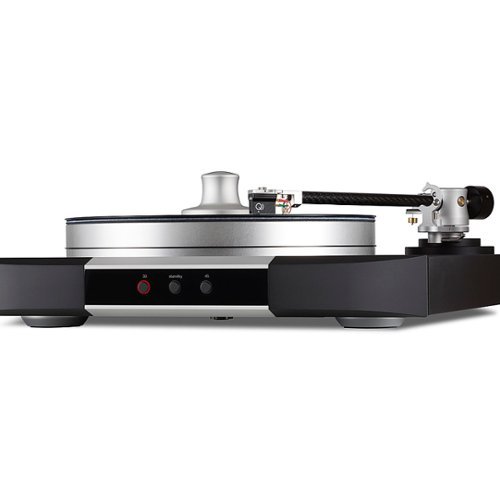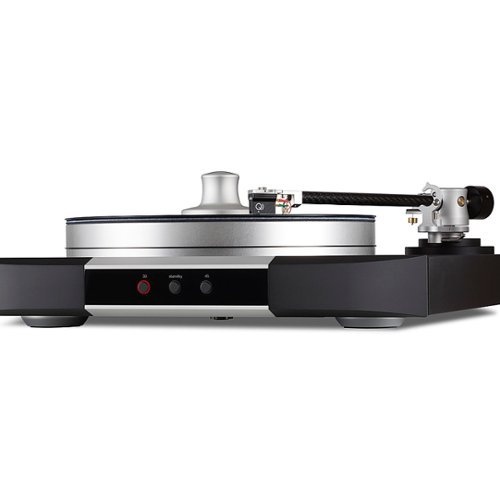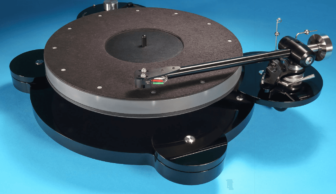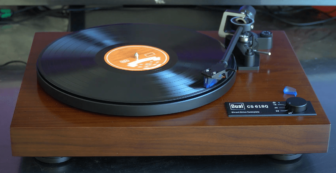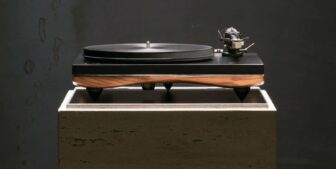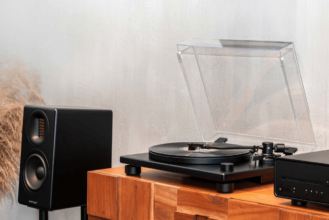Mark Levinson No5105 Review – The second coming
Mark Levinson’s sophomore turntable matches refreshing simplicity with supreme sound. So much for that difficult follow up. Read our Mark Levinson No5105 Review.
There’s a commonly held misbelief that just because something is built to a supremely high standard or is in any way exotic or expensive it follows that it will also require a degree-level knowledge of basic engineering just to get it up and running. This done, you’ll then need to stay on top of the latest thinking regarding astro physics and computer programming to ensure you’re able to work the damn thing to the best of its abilities. Though there are plenty of examples of high-end components that fit into this bracket, Mark Levinson has opted to keep things simple with its No5105, which has more in common with starter decks that come in at under £ when it comes to setup and operation.
The real trick, of course, is while appealing to those that want an easy life when it comes to putting the turntable together, it also offers a logical upgrade path for those that want to tweak the performance to their individual tastes. Happily, you can put a sizable tick into both of these respective boxes.
The follow up to the company’s deeply impressive No515 debut turntable, the No5105 comes in at just under half the price of its predecessor – available sans cartridge or bundled with Ortofon’s Quintet Black S MC pick-up (HFC 425). The price differential between the decks is no doubt due to the fact that the former comes from the company’s cost-no-object range, while the latter derives from the entry-level lineup, for which no-fuss ownership is a key attribute.
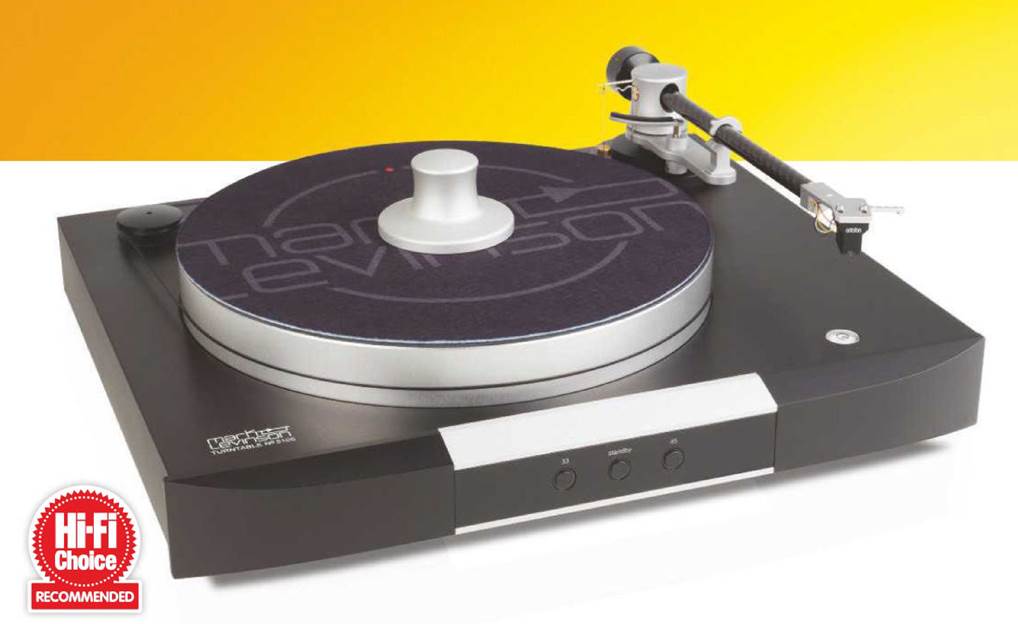
ORIGIN USA
TYPE Belt-drive turntable
WEIGHT 34kg
DIMENSIONS (WxHxD) 438 x 154 x 395mm
FEATURES
• 33 and 45rpm
• Optional Ortofon Quintet Black S cartridge
• 10in carbon fibre tonearm
DISTRIBUTOR Harman Luxury Audio Group
TELEPHONE 01223 203200
WEBSITE marklevinson.com
Where the No515 took its lead from VPI’s turntables (no surprise given that it was built by them), the No 5105 instead is a clean-sheet offering with no components picked up off-the-shelf. Designed and conceived entirely inhouse, the deck is produced by a specialist firm in Germany Though setup has so much in common with beginner decks, that’s where the similarities end. You can sense the engineering prowess and see the luxury design the minute you take it out of the box. From the ruler-straight edges and opulent black finish to the hefty slab of plinth, reassuringly weighty platter and exacting design of the supporting feet, this is the sort of top-drawer quality that doesn’t come cheap – and absolutely doesn’t come close to looking it.
The intricate precision starts at the front with the red-lit speed selection and power on/off controls nestling perfectly in a machined inset. The remainder of the deck follows suit, being as temptingly uncluttered as a basic Rega or Pro-Ject, with only the absolutely necessary components in use: pulley, platter and tonearm.
Machined, bead blasted and anodised alloy structures feature throughout the chassis, which incorporates two black, 25mm-thick front panels and a naturally anodised (clear) bezel at the centre of the frontispiece – the latter additionally hosting a solid glass setting for the alloy speed and standby buttons. The 6kg platter is fashioned from the same alloy with a substantial hardened steel spindle bearing that sits within sintered brass bushings. Even the record weight is a piece of design excellence – inspired as it is by Mark Levinson’s hourglass motif also witnessed in the tonearm’s gimbal housing and knob design of the company’s pre and integrated amplifiers. Fashioned from a stylish
The way it drags every tiny nuance of detail out of the groove is incredible bead-blasted alloy, it’s pleasing density comes courtesy of a solid brass insert.
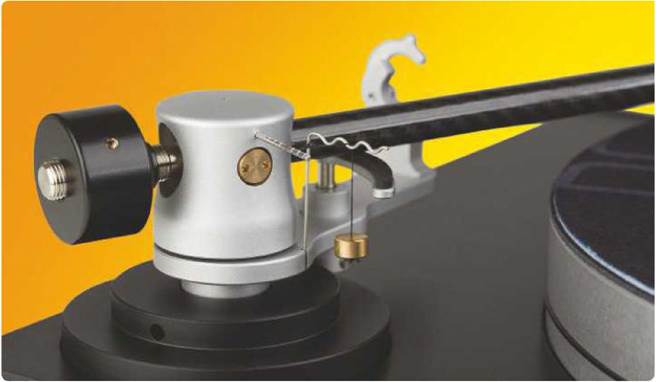
The 10in carbon fibre tonearm is fixed, so this is one area where you won’t be able to upgrade, but this is common on many rivals. Thankfully, it’s a gem, especially if you use low-compliance moving-coil carts.
The tools supplied to aid setting up of overhang, VTA etc. are among the very best we’ve seen, while the manual – supplied with the mat in a gatefold sleeve – walks the user through setup in a logical and easy to understand way. Admittedly, hooking up the hanging thread of the antiskate weight is a fiddly process that requires a steady hand and endless patience – but this is common on the vast majority of turntables and is by no means unique to the No5105. More
frustrating, however, is the belt. This has a square cross section, which means that while looping it around the platter and drive pulley it’s all too easy to get twisted. A few rotations quickly alleviates this minor complaint, but it’s something to keep an eye out for. One last mention should go to the built-in spirit level, which is an inspired addition to aid setup that rivals would do well to take note of.
As previously mentioned, there’s the option to get the No5105 bundled with Ortofon’s Quintet Black S, which is a peach of moving-coil cartridge and a great match for the phono stages built into all of Mark Levinson’s preamps and all but one of its integrateds. The mat supplied is a thin, almost papery type, meaning that it’s worth exploring as a potential upgrade avenue further down the line. During testing we experiment with a variety of conventional felt and rubber alternatives – each revealing its own pleasing attributes. Finally, there is no interconnect included in the box as Mark Levinson sensibly reasons that this is a choice that should be placed firmly into the owner’s hands.
Sound quality
Though vinyl can never really hope to match the near-perfect silence of digital sources – unless you’re spending serious bucks on DS Audio’s optical cartridge – what’s on show here with a Mobile Fidelity pressing of Charlie Mingus’ Ah Um comes pretty damn close. This offers up the perfect opportunity to see how the No5105 fares with a 45rpm record, and the results are far from disappointing. For reproducing a live performance, the atmosphere of an intimate club that’s positively jumping or simply the spontaneity of a small jazz ensemble that’s positively ‘on it’, the background silence on show here is a peerless positive. There’s an airiness and sense of space that creates a imposingly large soundstage, providing the music an impressive sense of freedom from the speakers. As disappearing acts go, the powers of David Blaine, Paul Daniels and David Copperfield combined would struggle to better this.
Moving up through the gears, it’s time for a 33rpm disc and some vocals. Carly Simon is called upon and her Speakers Corner pressing of No Secrets comes up trumps. Detail obsessives will be left dumbstruck by the way the Mark Levinson seems to effortlessly drag every tiny nuance out of The Carter Family – most notably Simon’s ‘breathiness’ – while swatting away any suggestion of sibilance with utter disdain. Similarly, the myriad of sounds are reproduced with unerring accuracy – particularly
It comes pretty close to matching the near-perfect silence of digital sources
Mick Jagger’s unmistakably nasal contribution in the background of You’re So Vain
Mark Levinson’s UK spokesperson James Todd tells us that the issues resulting from using a heavy platter apart, a three-point suspended sub-chassis was ruled out not only on the grounds that it complicates setup, but also because it doesn’t necessarily deliver any sonic rewards – something that’s conclusively proven if the turntable is sited on a substantial stand, clear from any airborne interference. But what if you don’t and are forced – say – to place it between and slightly to the front of the speakers where results would ordinarily be far more mixed?
Impressively, under such conditions the combination of substantial platter and plinth with those impeccably engineered feet and the ability to get it perfectly level (take a bow built-in spirit level) mean that piffling concerns such as microphony are contemptuously side stepped with apparent ease.
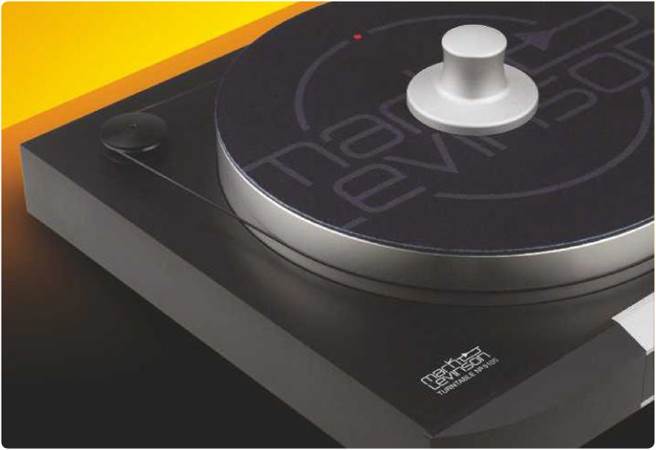
A complete change in pace comes courtesy of Whitesnake compilation Love Songs, which offers up a direct contrast to the finesse of Simon and the intimacy of Mingus in its far from subtle blend of stadium rock grandiosity and wall-of-sound guitar pyrotechnics. Impressively, it displays the same characteristics as before, with the opening notes of Love Will Set You Free filling the room with the sound of hair rock, while keep a fi rm control of the subtler aspects of the performance – few and far between though they may be. As impressive as the lack of noise and openness are, what really impresses here is the deft handling of lower frequencies – underlining if nothing else that the No515 is absolutely genre agnostic and will show its very best whether digging out the details from the grooves of Chopin, Phil Collins, Public Enemy, Four Tet or Joni Mitchell.
A final test highlights a possible upgrade path by swapping out the Ortofon in favour of a selection of other moving-coil mainstays from the likes of Koetsu and Denon. Though the genre has once again changed – this time with Jackie Wilson taking centre stage with his lung-bursting rendition of Whispers – the performance retains that same consistent neutrality
throughout the midband, coupled with impressive lower frequencies and a deft handling of power. And few performers better convey power than Wilson at his diva-ish best as he veers wildly from the whispering that gives the track its name through the octaves to the upper registers that give bats and dogs cause for concern. Regardless of the cartridge, the Mark Levinson holds the performance together with seeming indifference to what ever we throw at it.
In sight
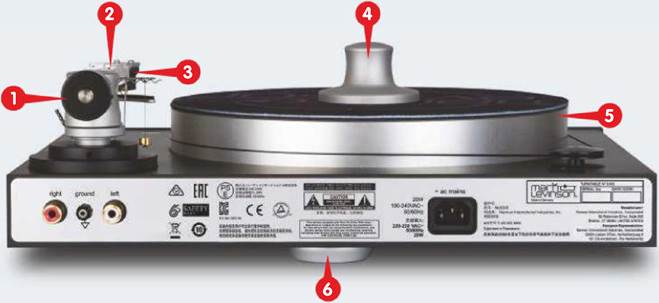
1) Adjustable counterweight
2) 10in carbon fibre tonearm
3) Optional Ortofon Quintet Black S MC
4) Alloy record weight
5) Solid aluminium platter
6) Adjustable isolation feet (one of three)
Conclusion
It perhaps goes without saying that ease of use and simplicity of setup are not the be all and end all when it comes to turntables, but they remain a significant factor in the overall experience of living with and using them. And it’s here that Mark Levinson scores its first major plus point with the No515. While most of its contemporaries at this price point tend to scare off newcomers and those that want to keep it simple with often exotic or unnecessarily complicated components, the US turntable specialist has realised the all-important appeal of the type of entry-level decks that continue to drive the vinyl resurgence forward: keep it simple, dummy.
That it goes on to combine such entry-level appeal with the sort of precision engineering and exactingly built components that are very much from the high-end end of the spectrum seals the deal. The result is a devastating combination of inky black silence, generous spaciousness, neighbour-worrying low ends and the subtlety to pick out nuanced details and effects that makes this a supremely talented performer. It might not be cheap, but in the same way that the likes of Montegrappa and Monteblanc or Breitling and Rolex produce exactingly engineered pens and watches, this is a taste of high-flying luxury that’s worth saving up the pennies to experience
OUR VERDICT
When you purchase through links on our site, I may earn an affiliate commission. Here’s how it works.
HOW IT COMPARES
Any LP-loving audiophile with £ burning a hole in his or her pocket is spoilt for choice here. If the ‘rectangular’ styling of the No5105 appeals then take a look at Yamaha’s ‘gigantic’ and ‘tremendous’ GT-5000 with its massive, polished plinth and radical in-line tonearm/ armshell. It’s designed to accompany the 5000 series amps and speakers, but it’s a superb turntable/arm combination in its own right.
By contrast, AVID’s Volvere SP (HFC 472) offers a spin on the ‘sprung sub-chassis’ design, the deck occupying a compact footprint while offering the isolation of a three- point suspension. With arm and cartridge options too, it’s another flexible and very fine-sounding deck.

